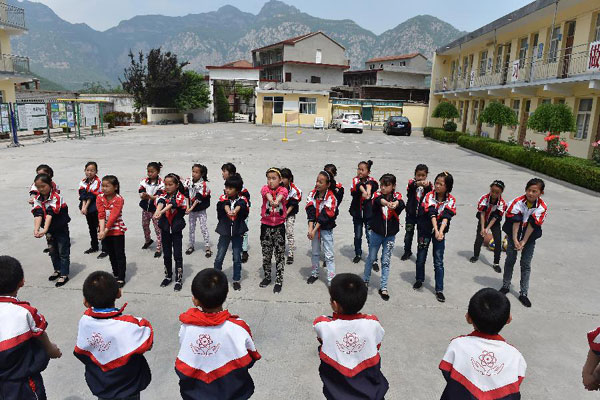 |
|
Boarders have a PE class at the primary school of Shicheng Township of Pingshun County, north China's Shanxi province, May 26, 2015. The children in the school are mostly left behind children whose parents work outside of their hometown. [Photo/Xinhua] |
Police in Guizhou province confirm that four siblings died after consuming pesticide
Experts said on Thursday that a case in which four siblings died after being left without parental care amid China's urbanization drive again exposes the plight of such youngsters.
|
Youngsters driven to despair Feb 25, 2008: Zhang Yangyu, 12, from Taihu, Anhui province, hangs himself because he misses his parents, who left after a short Spring Festival family reunion. The parents moved to a city for better jobs. July 3, 2010: Five students from Xinglin, Shaanxi province, agree to commit suicide together by drinking pesticide in an old temple. A passer-by finds them and all five survive. Four had parents who had moved far away to work. June 15, 2011: Xiao Yang, 10, from the village of Dawang in Xi'an, Shaanxi province, kills himself by drinking pesticide. He was looked after by his grandparents because his parents had gone to work in cities. June 17, 2013: Two girls, Xiao Li and Xiao Yu, both 12, from the village of Xingrong in Jiangsu province attempt suicide by taking sleeping pills after their parents move away. They are found and taken to a hospital. Both survive. Jan 20, 2014: Li Xiaolin, 9, from Wangjiang, Anhui province, hangs himself because his mother, who was working in a city, would not come home for Spring Festival. |
The four, aged 5 to 13, consumed pesticide at their home in Cizhu, a village in the city's Qixingguan district at about 11 pm on Tuesday in an apparent suicide attempt and later died in a hospital, police said.
The children had been without parental care since March after their father, Zhang Fangqi, left to take a job far from home. Their mother, Ren Xifen, had left home in March last year after a bitter feud with her husband.
The deaths come two and a half years after an incident in which five street children were found dead in trash in Bijie. The five, found more than a week after they disappeared, had lit a fire to stay warm on the night of Nov 15, 2012, before they died from carbon monoxide poisoning, police said.
As of Thursday, local authorities had been unable to contact the four siblings' parents.
Caring for themselves, the siblings had been living among 500 kg of stored corn and 25 kg of preserved meat in a three-story home.
Zhang sent money to a bank account he had set up for his eldest son, police said. The local government had provided the family with a minimum living allowance since 2012, and the account had more than 3,500 yuan ($560) in it.
Pan Ling, a distant relative of the children, said they were socially withdrawn and often skipped class. The grandparents, who otherwise would be taking care of the children, had died.
The incident on Tuesday is at least the sixth case nationwide since 2008 in which children who were left without parental care apparently committed suicide or attempted to.
The Bijie city government said after the 2012 incident that it would launch a special fund of 60 million yuan ($9.7 million) each year to help children who are left without parental care.
Bijie Mayor Chen Changxu said in November 2012 that the incident that year had exposed vulnerabilities in the city's social management and the care of "left-behind" children.
Chen vowed that the city would establish an archive system to keep track of all children without parental care and would ensure that no children were left on the streets.
However, Tang Jun, a social policy researcher at the Chinese Academy of Social Sciences, said Tuesday's incident "showed that the government intervention measures have failed. The role of parents cannot be replaced, and the best way is to ensure that the children go with their parents as they migrate to other cities to work".
"For decades, we have merely required a workforce from the migrant workers. If we do not provide them with more social benefits, similar cases will take place again and again," he said.
Li Yifei, deputy director of the Scientific Communication and Education Research Center at Beijing Normal University, said "left-behind" children have a much bigger chance of experiencing psychological problems.
"Intervention would also be difficult because normally the children would not display abnormal behavior, even if you try to ask questions. However, they generally evade or react strongly to questions about their parents," he said.
The role of teachers can also be crucial, he said. "Teachers should receive psychological training to monitor the mental state of children. The key is to identify the children who might have mental problems and ensure that there will be intervention in time.
"However, there are few teachers or psychological workers in regions where the left-behind children are concentrated," he said.
Xinhua contributed to this story.
Contact the writers through xuwei@chinadaily.com.cn
